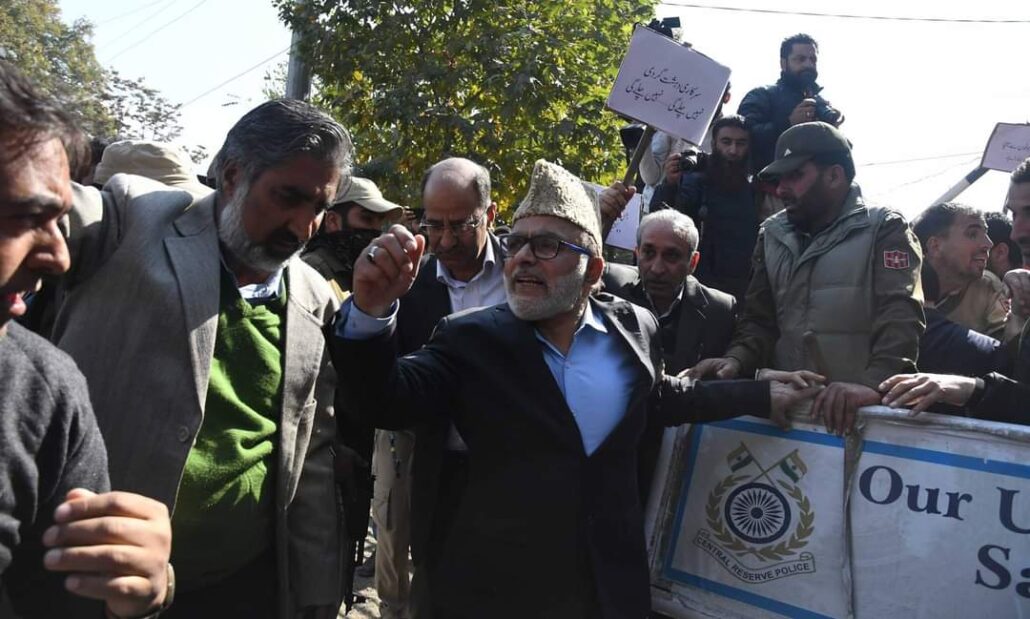
The Khanyar constituency in Srinagar’s downtown area is gearing up for a competitive battle in the upcoming Jammu Kashmir assembly elections.
Khanyar, known for its historical significance and the Dastgeer Sahib Khanqah, stretches from Khayam to Khwaja Bazar.
Javed Ahmed, a known political analyst, noted, “Given Khanyar’s urban profile, concerns about basic civic amenities, job opportunities, and local infrastructure are likely to be at the forefront of voters’ minds.”
Elections will be held in the constituency on September 25 during the second phase of the ongoing assembly elections in Jammu Kashmir.
Among those in fray is National Conference stalwart Ali Mohammed Sagar. Other notable candidates include Sheikh Imran, former Deputy Mayor of Srinagar, running as an independent, Apni Party’s Bilal Ahmad Mir, and PDP’s Tafazul Mushtaq.
“Sagar has built deep connections with the electorate over the years. While there are several candidates in the race, his rapport with the local community makes him the frontrunner,” said Javed.
Ali Muhammad Sagar, the long-serving NC-Congress candidate, is once again contesting the seat. Sagar, who has held the seat since 1996, secured victory in the 2014 elections by a margin of 1,167 votes.
The area includes key localities like Kaw Mohallah Auqilmir, Qadri Kocha, Baba Daemb, and Roz Bal. The voter base has grown significantly, rising from 51,011 in 2014 to 91,226 in 2024, highlighting the constituency’s importance in the political arena.
The area includes key localities such as Roz Bal, Baba Daemb, Kaw Mohallah Auqilmir, and Qadri Kocha.
“The voter base has grown significantly, from 51,011 in 2014 to 91,226 in 2024, emphasizing the increasing importance of the constituency in the political landscape,” said Javed. He said that the presence of six independent candidates adds an unpredictable element to the race, making it difficult to foresee the outcome.
The Jammu Kashmir National Conference has a strong cadre base in Srinagar’s Khanyar segment; in 1967 Ghulam Ahmad of the Indian National Congress won and later in the 1972 elections, Saif-ud-Din Qari of Jamaat-i-Islami gained victory. The Jammu Kashmir National conference has never lost on the seat since 1977 when it re-joined the electoral fray.
Another important issue is security. “With Srinagar being a sensitive area, the security situation and how candidates plan to address local safety concerns will play a significant role,” according to Aadil Khan, a local resident.
The ongoing elections in Jammu Kashmir are significant as they mark the first electoral process in the region in a decade.
Following the abrogation of Article 370 in 2019, these elections provide an opportunity for residents to express their concerns and aspirations democratically.
Economic concerns may also dominate discussions. “Voters are looking for candidates who can deliver on economic revival, especially after the downturn caused by political instability in recent years,” says Shazia Rashid, another local resident.
These issues, combined with the growing aspirations of a younger electorate, will likely shape the outcome of the Khanyar election.
Ali Muhammad Sagar, the NC-Congress candidate, may find the contest a cakewalk due to his strong support, said Javed.
“One cannot turn a blind eye to Sagar’s significant contributions to his constituency. Many believe that since the abrogation of Article 370, progress in the area has stalled, and there is a strong desire among the people for Sagar to return to office,” Javed told The Kashmiriyat.




